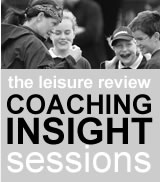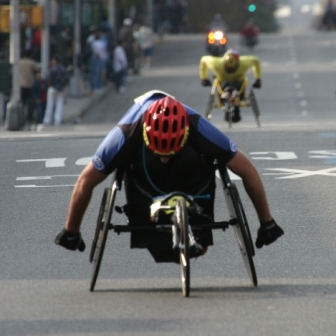
Full details of the five-event Coaching Insights autumn programme are now available.
Breakfast for champions, or at least their coaches
On hearing that someone was running a CPD workshop for coaches, Joe Coach went under cover to compare like with like.

Toughness: one of the key elements of high-performance sport
With the August weather inclement enough to keep hardened members of a golfing society munching bacon rolls and debating climate change, Pike Hills Golf Club on the edge of York was rather more busy than might be expected at half past eight of a Thursday morning when more than 20 sports coaches from all over Yorkshire and beyond turned in for a Sports Coach UK High Performance breakfast.
Fortified with yet more bacon rolls, the delegates, from backgrounds as diverse as angling, athletics and academia, were introduced to the workshop’s concept by its creator, Paul Connolly, a man who revels in the job title of ‘coaching network manager North East, Yorkshire and Humberside’. The programme is designed for coaches who work at the high performance level, or are simply high-performing, and the programme’s long-term aim is to create a community of practice “in order to focus efforts in sharing knowledge, solving problems, or innovative ventures”, to coin a phrase. Having recently crossed the Pennines, Connolly was keen to replicate the successful programme he ran in the north west and indeed to see it rolled out throughout England.
The invitation made it clear that the content was to be aimed at Level 3 coaches, or those with aspirations to this level, and there was an expectation that the subjects under discussion would be high brow. There was trepidation, at least on your correspondent’s part, that it might be overly technical but the speakers seemed as commited to entertainment as they were to enlightenment and the 90-minute session flew by.
The tone was set by Andy McCann, a mental skills performance coach with a list of clients that includes the Welsh rugby team. He compared the introduction Connolly gave him with one which involved dancers and drummers from the Australian troupe Stomp and three men juggling chainsaws. There used to be four, he reckoned.
Having shown a video of Wales’ 18-year-old winger George North scoring on his debut against South Africa, McCann talked about mental toughness, identifying five areas where performers can sometimes need help. North, unable to make his legs work the morning after having been told he would be up against Bryan Habana in front of 74,000 people in a stadium he had never before visited let alone played at, needed what McCann calls “in-the-moment toughness” to control anxiety together with excitement to function at the peak of his abilities. Sticking with the Welsh squad, he referenced coach Warren Gatland’s “decision-making toughness” and spoke about the mindset required by top coaches. “Endurance toughness” is the ability to stay focused and motivated over long campaigns such as that undertaken by Michael Phelps, whose coach was quoted as saying that winning less than eight gold medals would have represented failure. The swimmer meanwhile was required to beat the world not once but eight times. McCann’s example of “turn-around toughness” was golfer Rory McIlroy, who recovered so succesfully from his meltdown at the US Open that he won the Masters. At the hub of this model was the quality of “aspirational toughness”, epitomised by Cassius Clay, a young man driven by vision and fuelled by self-belief.
The second speaker provided something of a contrast. Neil Franklyn used to be a firearms officer with the Metropolitan police and his subject was the use of briefings by police, the armed services and some sports coaches. His point, that well-structured briefings save time, create the correct mindset, clarify responsibilities and establish contingencies, was well made and the audience were engaged as they worked out for themselves how much use Franklyn’s information would be. Responding to this, Andy McCann reported that when the Welsh national team’s coaches were exposed to the same information they were very taken with it and McCann gave his own opinion that in elite sport one specific phase, ‘the debrief’, was particularly badly done.
Franklyn had clearly developed his presentation for the corporate audience and the man who followed him, the BBC’s “business doctor”, Dr Paul Thomas, gave so polished a performance that he bordered on being ‘inspirational’ in the worst sense of the word. His theme was leadership and his vehicle anecdote. Like McCann, he is very Welsh and were a cynic to describe him as “the Max Boyce of business” it would be done indulgently; but he does like a funny story. Binmen in Blaenau Gwent, dolphins, cows and Swindon’s magic roundabout all came into play but the common message was always “Stop managing”. Without people with portentous job titles trying to drive change down from the top, an organisation will emerge organically from its grassroots. This is a lesson, Thomas suggested, that national governing bodies of sport (NGB) would do well to learn. His last word would have warmed the cockles of many a grassroots coach’s heart and frozen the marrow of Big NGB: “Be fluid, be flexible, be adaptive,” he said. “Being creative and free-thinking will develop better organisations which are more sustainable.”
To close both Paul Conolly and Andy McCann spoke about the benefits of collaboration and the value of a community of practice with words like ‘effective’, ‘challenge’ and ‘nourishing’ being used. Whether the audience were quite ready for the last must remain moot, although Connolly should be applauded and supported in trying to create something organic that relies on people interacting rather than something target-driven and imposed from above.
Joe Coach is the nom de plume of a highly experienced and impressively qualified sports coach.
The Leisure Review, September 2011
© Copyright of all material on this site is retained by The Leisure Review or the individual contributors where stated. Contact The Leisure Review for details.
Download a pdf version of this article for printing